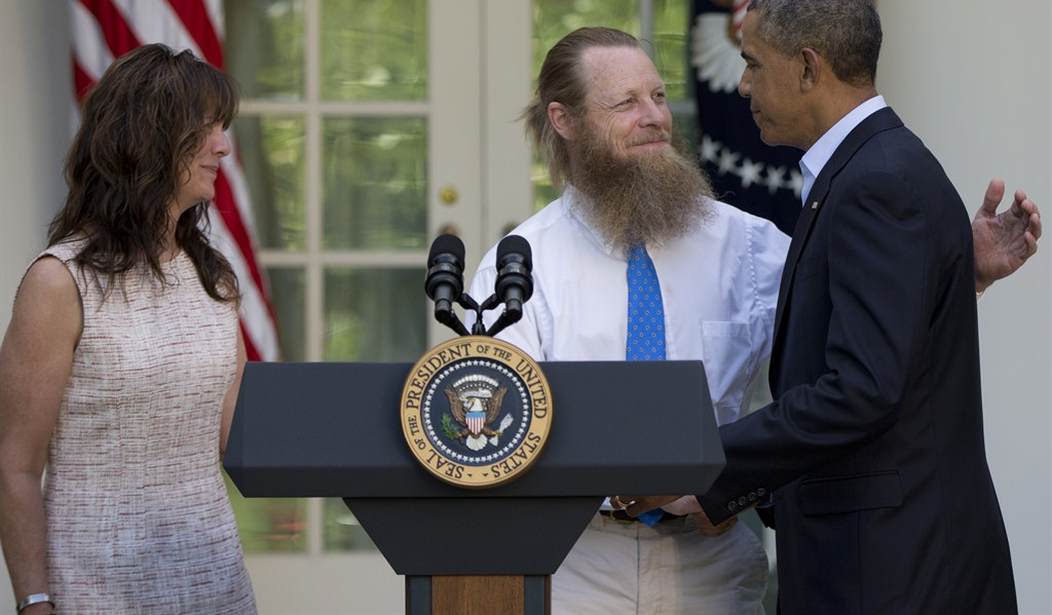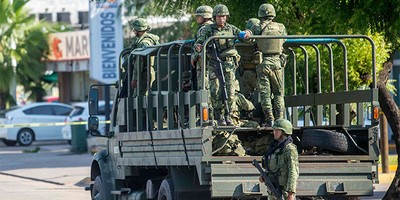This is a theory first floated (to my knowledge) by bestselling author Brad Thor, whose piece I linked last week. Now the Washington Free Beacon has tracked down a senior US intelligence official who effectively endorses the idea as not just plausible, but likely -- a conclusion buttressed by his extensive experience dealing with the Haqqani network. Some context: Prior to his release, Bowe Bergdahl was being held by members of the Haqqani network, a US-designated terrorist organization. Haqqani and the Taliban are not one in the same, with the former group acting as a crime syndicate with a radical Islamist agenda. They're "80 percent Tony Soprano and 20 percent Al Qaeda," is how Thor put it in a telephone conversation last week. According to this official, Haqqani would be more interested in being compensated monetarily than in a prisoner/hostage trade, especially one in which they were not the primary beneficiary. Recall that of the five jihadi commanders freed in the deal, four were Taliban, and only one was (arguably) primarily Haqqani. Fox News also reported that the US paying a cash ransom for Bergdahl was under discussion as recently as December, so this isn't purely or baselessly speculative:
The ransom plan was reportedly abandoned, but the intelligence official insisted that there is reason to believe that cash changed hands as part of the deal. “The Haqqanis could give a rat’s ass about prisoners,” the official said, referring to the Haqqani Network, a designated terrorist group in Afghanistan and Pakistan, and the five Guantanamo Bay prisoners who were freed in exchange for Bergdahl’s release. “The people that are holding Bergdahl want[ed] cash and someone paid it to them,” he said. The theory relies in large measure on a distinction that has been lost in much of the press coverage of the Bergdahl deal. A number of news reports on the circumstances surrounding the prisoner exchange have used “Haqqani” and “Taliban” interchangeably...Haqqani, he said, “benefits zero from the prisoner exchange. … Based on 10 years of working with those guys, the only thing that would make them move Bergdahl is money.” … “We just funded them for the next 10 years is my guess,” he said.
Lachlan Markay's report also mentions the fact that higher-ranking Haqqanis were not included in the trade, which raises additional questions about how exactly that group benefitted from the swap. Then there's this: One of Haqqani's top money men and fundraisers was gunned down in Pakistan late last year, which may well have imperiled the group's finances. The likelihood that they're strapped for cash aligns with suggestion that Bergdahl's captors were motivated by money. In April, the Associated Press reported that Bergdahl's hostage-takers were "anxious to release him." The State Department has declined to say whether there was a cash component to the Bergdahl deal, which should have journalists digging. The White House should be pressed on this question -- which ought to be phrased broadly enough to incorporate the possibility that any potential remuneration may either have been indirect (i.e., not "officially" paid for from US coffers), or came in a form other than straight cash. "Did the Bergdahl release pact entail any type of ransom payment, in addition to the release of five Guantanamo detainees?" If the Obama administration facilitated the release of five high-risk terrorist commanders and some sort of financial remittance, the political firestorm burning in Washington would only grow hotter. The White House has tried to cast the deal as a traditional prisoner exchange, an assertion contradicted by separate reports and administration claims. If it's revealed that the government also paid a ransom, their operating premise would be officially dead. But if the radicals who were actually holding bergdahl weren't particularly interested in the detainee side of the trade, why did it happen? There's a working theory among some critics of the deal that Team Obama was most keen on the release aspect, as they'd been looking for an excuse to free these five men since early 2009 -- before Bergdahl abandoned his post. Closing Gitmo -- an Obama ideological obsession -- would require some aggressive detainee repatriation, after all. Allahpundit picks up the thread:
Recommended
If the Haqqanis didn’t care about prisoners and if they really didn’t care about Taliban prisoners specifically, how on earth did four Taliban bigwigs end up being part of the handover? If you believe that O’s prime motive in all this was unloading some weight from Gitmo in preparation for closing it, you already know the answer. If Markay’s source is right, it may be that the U.S. was more eager to include the Taliban Five (or four) in the deal than the Haqqanis were. Obama wanted them gone but he was afraid of the political backlash if he simply released them to Qatar’s custody having gotten nothing in return. So he constructed a deal for Bergdahl which he knew he could kinda sorta defend using the principle “leave no man behind.”
The president told NBC News that the decision to move forward with the Bergdahl exchange was "unanimous" among the "principals" of his administration, adding that he'd "continue to do [these sorts of deals] whenever I have an opportunity." Not only does he have no apologies, and not only would he do the same thing again -- he's eager to do it again. Good to know. The unanimity he cites, however, was aided by two factors: (1) High-ranking officials who had problems with the plan (Panetta, Hillary, Gates) are no longer in the decision-making loop, and (2) many of the loudest objectors were cut out of the process this time. One official described Obama's decree as an instance of "forced consensus." Everyone was unanimous because they had to be. Liberal Democrat Dianne Feinstein, meanwhile, continues to be a thorn in the administration's side, as she called into question the White House's latest excuse for bypassing Congress:
Feinstein (D-CA) Says No ‘Credible Threat’ to Bergdahl (Transcript) http://t.co/tksZoLDcbg @BloombergNews
— S2 (@StewSays) June 6, 2014
Feinstein and her Republican intel committee counterpart, it should be noted, kept the Bin Laden raid a secret for months. But she couldn't be trusted to keep this non-secret? Bullocks, she says. I'll leave you with Andy McCarthy -- who broaches the "I-word" a new book -- strongly dissenting from Charles Krauthammer's somewhat surprising defense of the Bergdahl deal.
UPDATE - A White House official responds on Twitter, pointing me to this blog post from last week:
The White House countered Rep. Steve Stockman, R-Clear Lake, in a statement Friday after the congressman had questioned whether President Barack Obama paid ransom for Sgt. Bowe Bergdahl’s release. “The United States did not provide money in return for Sgt. Bergdahl,” National Security Staff spokeswoman Caitlin Hayden said.
Case closed? Maybe. This spokesperson's denial is unequivocal, but narrow. The administration is avowing that the US government did not make a direct monetary ransom payment in exchange for Bergdahl. (Again, the idea of paying a cash ransom was reportedly debated at several points during Bergdahl's captivity, so it's not a crazy line of questioning). My follow-up would be a broader question asking if the US was aware of any form of ransom payment being attached to the Bergdahl deal, which would cover the possibility that we facilitated an indirect payment of some sort. A categorical denial on the record would be helpful. If they're lying, let's see the evidence.
























Join the conversation as a VIP Member